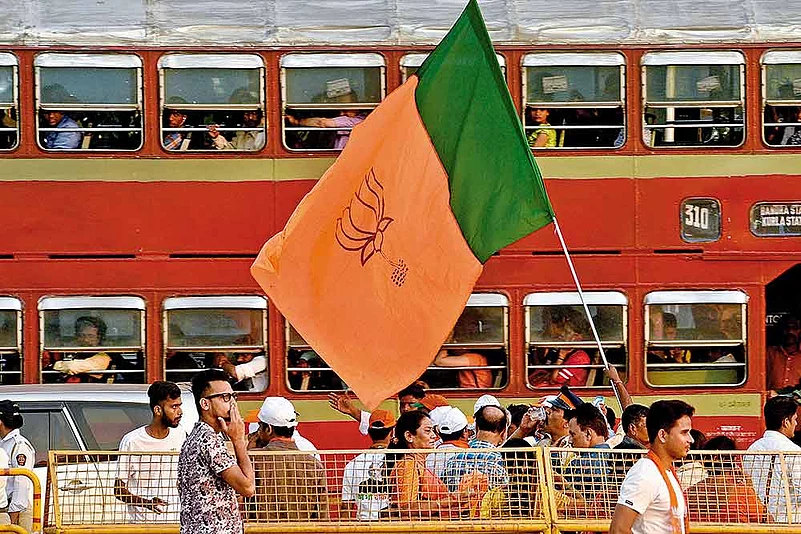The Marathi Manoos has spoken and right now his overwhelming support is for the saffron party. If the mood of voters were to reflect in numbers, the Sensex would be as appropriate an index as the election results. Crossing 40,000 for the first time, the Sensex has been at an all-time high since the exit polls declared the BJP to be a clear winner. It closed lower than the magic number because of profit-booking, but there is no mistaking the market’s mood—as also that of Maharashtra’s voters.
“We had observed a silent wave in PM Modi’s support, which would transform into a tsunami. Especially the middle class and the poor were eager to elect Narendra Modiji. And…Modiji has got a never-before mandate,” CM Devendra Fadnavis told the press, adding that people in drought-hit Maharashtra believed his government’s promise of supporting them with the help of the Modi government.
The Congress and the NCP got a drubbing across the state, while the CPI(M) lost in Dindori, from where the Kisan Long March had started this February. “We can see three factors at work—jingoistic nationalism, communal polarisation and corporate power,” says All India Kisan Sabha general secretary Ashok Dhawle. “This government has not fulfilled any promise it made in 2014. Several issues such as the agrarian crisis were reflected in the assembly polls that year, but not this time.”

The past few years have been marked by protests for loan waivers and minimum support price. Unemployment and migration is on the rise. The state also witnessed agitations for Maratha reservations and for the repeal of Scheduled Castes and Tribes (Prevention of Atrocities) Act. Not to mention the beef ban associated with several incidents of vigilantism. Murder trials of rationalists Narendra Dabholkar and Govind Pansare and alleged involvement of Sanatan Sanstha members have been in the public domain. There were protests against the arrests of human rights lawyer Surendra Gadling, author and cartoonist Arun Ferreira, rights activist Vernon Gonsalves and others in the Bhima-Koregaon conspiracy case. There were also demonstrations to “save the Constitution”.
However, none of these became a rallying point in the election. With more than half of Maharashtra’s population now urbanized, and young voters even in the townships within rural constituencies hoping that further industrialisation would generate employment for them, agrarian distress might not have been a big factor. Moreover, with high migrant populations in the big cities, local issues may not have been top of the mind when it came to voting decisions in the Lok Sabha polls.
“When Rajiv Gandhi and Atal Behari Vajpayee won, no one doubted them. But this time there have been doubts over EVM functioning,” said NCP president Sharad Pawar. “The state is reeling under severe drought and we will continue to work to help farmers.” Parth Pawar, for whom Sharad Pawar is said to have given up his candidature, lost in Maval. In Mumbai, it was the second rout in a row for the Congress. Despite Mukesh Ambani’s endorsement, its South Mumbai candidate, Milind Deora, lost to the Shiv Sena’s Arvind Sawant. A relatively new BJP candidate in North-East Mumbai, Manoj Kotak, defeated the NCP’s Sanjay Dina Patil. “The vote is for PM Modi,” says BJP leader Madhav Bhandari. “Apart from schemes for the downtrodden and deprived class, people wanted a strong government for the defence and security of this country. People want a corruption-free government. Sonia Gandhi is the fourth richest candidate, but what is her occupation? Modi’s assets are all known. Even when our allies win as part of the NDA, it is because people have reposed their faith in Modi.”
Congress state spokesperson Sachin Sawant mouths the usual words. “The people of the country have decided to give a singular mandate to the BJP and we accept that. We will also introspect about where we missed,” he says. According to Loksatta editor Girish Kuber, the Maharashtra Navnirman Sena’s Raj Thackeray seemed to be more effective than Congress leaders. “There were no rallies by Rahul and Priyanka Gandhi in the state. But the BJP’s victory margins were unexpected. It means majoritarian politics has won,” he says.
Sawant says the Congress too has some expectations from the BJP. “Whatever mistakes they made, such as demonetisation, which caused job losses and even deaths, should not be repeated. They will hopefully protect democracy and its institutions. We, as the Opposition, need to stand guard for democracy and ensure that Gandhiji’s teachings prevail and Godse’s line of thought does not overpower. In that respect, the BJP doesn’t look too positive.”
***
- 40,000 votes by which former chief minister Ashok Chavan lost in Nanded, a seat he had won in 2014
- 0 The Congress drew a blank in Mumbai, lost all six seats


























